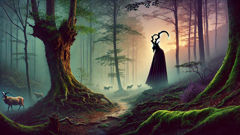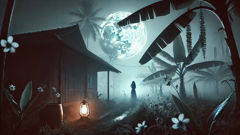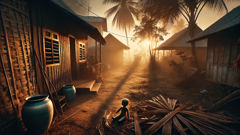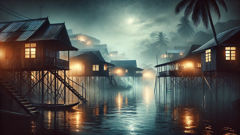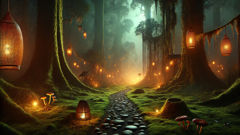Introduction
Beneath the mighty shadows of Slovenia’s ancient forests, where mist drifts low over emerald moss and river stones shine beneath the filtered sun, whispers travel on the wind—old as the roots that clutch the black earth. These are the whispers of Veles, the horned god, whose domain sprawls from the greenest pastures to the deepest, lightless caverns and the restless rivers that carve the land. Where cattle graze and herders sing, they offer milk to the stones for his favor; where fog curls over the fields, children hush and listen for the rumble of his voice, distant thunder that is both a promise and a warning. In every droplet of dew and in every shadow at the edge of firelight, Veles’s presence is felt—at once generous and cunning, at once the bringer of wealth and a master of secrets.
In this land, the boundary between worlds is thin. Slovenia’s valleys hold lakes so deep their surfaces mirror the sky, and hills rise like sleeping beasts. The people know that the world above—the realm of Perun, god of sky and thunder—rests in uneasy balance with the world below, where Veles reigns in coiled silence. The clash of these gods shapes the cycles of flood and drought, the fate of herds and harvests, and the hidden paths through life and death. To honor Veles is to respect the mystery beneath every stone, the treasure and danger in every shadow, the wisdom in transformation. For Veles is not merely a god to be feared or worshipped—he is the wild heartbeat of the earth itself, tangled in the roots of all things, waiting to awaken.
Rivalry in the Skies: Perun and Veles
In those forgotten days before the calendar’s reckoning, when Slovenia’s lands were wild and the river Sava cut a shining path to the horizon, two mighty powers held sway over the world’s fate. Perun, lord of thunder and flashing spear, ruled the heights—his oak trees crowned every mountain, and his lightning scorched the sky in displays of untamable might. But below, where shadows pooled and streams wound through reed and rush, Veles reigned. Unlike Perun’s blazing certainty, Veles was a master of ambiguity—a god of magic, transformation, and cunning, with a crown of horns and eyes reflecting the secrets of earth and water.
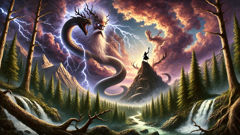
The people revered both gods, for their rivalry gave rhythm to the world. When Perun hurled bolts from his storm-chariot, the air filled with the scent of ozone and the wild hope of rain. Yet when the thunder faded and the ground drank deeply, it was Veles who guided the water through roots and stones, coaxing new life from the mud. He was called the Lord of the Underworld, keeper of hidden treasures and cattle, protector of flocks and those who wandered between worlds. In his shape-shifting form—sometimes serpent, sometimes wolf, sometimes a simple herdsman with a crooked staff—Veles walked unnoticed among mortals and spirits alike.
It was said that every year, at the end of winter, Veles dared to climb the World Tree, reaching for the golden treasures in Perun’s hall. He would steal away with knowledge, cattle, and sometimes the very fire that fueled creation itself. Perun, fierce with anger, would chase him with thunder and storm, driving Veles down through the branches, over mountains and rivers, until he vanished beneath the earth’s skin. The battle raged across the heavens, spilling rain and lightning, uprooting trees and flooding fields. Yet as the chase ended, and Veles returned to his realm, balance was restored: the world awoke green and fruitful, herds multiplied, and streams ran clear once more.
But one year, the cycle broke. In the village of Zlatorog—so named for the golden-horned mountain goat that watched over its slopes—the people awoke to find their cattle sickening and the river running low. The wise woman, Baba Mira, read the bones and found ill omens: someone had broken the sacred pact. Offerings to Veles had been neglected, for a new priest from the east had declared him a devil and demanded loyalty only to Perun. The villagers, afraid of thunder and eager to please the new power, had left the god of earth and water forgotten. With each day, the river shrank, and darkness gathered at the edges of dreams.
That night, as rain threatened but did not fall, Baba Mira slipped to the riverbank. She knelt among the stones and whispered an old song, calling Veles by his secret names. Mist rose and curled around her; the river’s surface quivered, and a shadow emerged—horned, immense, his voice like distant thunder muffled in moss.
“Why have you called me, wise one?” he rumbled.
She wept. “Your name is forgotten here. Our cattle die. The earth is cracking. We are lost.”
Veles considered her, eyes glowing green in the gloom. “I demand respect, not fear. Yet your people have turned away.”
Baba Mira bowed. “Forgive them. Show them your power, but grant us mercy. Remind us who you are.”
The god’s gaze softened. “Very well. I will return what was taken, but my lesson will not be gentle.”
So began a season unlike any before. The air grew thick with strange dreams; children saw shapes in the fog, and the fields shimmered with unseasonal frost. The priest grew afraid and hid in his house. Baba Mira stood firm, guiding the people to remember old songs and forgotten rituals—placing bread and honey at the crossroads, pouring milk onto the stones. In time, the river returned, full and fierce, its banks brimming with new life. Cattle grew strong, their coats glossy as moonlight. Yet always, in the dusk, villagers glimpsed a horned shadow at the edge of vision—a reminder that Veles was watching, his forgiveness earned but never to be taken for granted.
The Descent: Veles and the Bridge of Worlds
With peace restored in Zlatorog, the seasons rolled on. Yet the pact between gods and mortals remained fragile—a balance between abundance and loss, order and chaos. As the next winter crept in, a deeper test awaited, one that would draw not only mortals but the spirits themselves into Veles’s web of transformation.
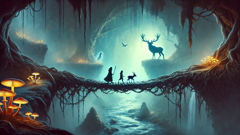
At the edge of the village, hidden by tangled willow and alder, a young herder named Luka tended his family’s cattle. He was known for his gentle hands and clear voice, singing old tunes that made even the wildest bullocks calm. Luka often wandered alone, feeling a strange kinship with the river and the stones—sensing that the world was wider and deeper than what lay above the surface. One evening, as snow began to fall and the sky faded to pearl-grey, Luka followed a lost calf into the woods. The animal vanished between two mossy boulders, and Luka, drawn by an echoing bell, stumbled into a clearing he’d never seen before.
There, suspended over a chasm where water roared far below, was a bridge woven from living roots and bones, adorned with silver lichens and icicles that gleamed in the moonlight. On the far side waited a figure—tall, crowned with antlers, his cloak shifting from fur to scales to shadow in the shifting light. It was Veles himself, standing as guardian of the passage between worlds.
“Why do you cross into my domain, Luka?” Veles asked, his voice as deep as the river in flood.
Luka bowed his head. “I seek my calf, but I would not flee from your gaze. My heart is full of questions.”
Veles’s eyes glimmered with amusement. “Few mortals dare to admit such things. To find what is lost, you must risk your soul.”
The god beckoned Luka onto the bridge. Each step was a leap through shadow and memory—visions flickered at the edge of sight: ancient herders singing beneath stars, children lost to the underworld, rivers running backwards and trees speaking in riddles. In the heart of the bridge, Luka saw the world split in two: above, Perun’s sky blazed gold and blue; below, Veles’s realm shimmered with secrets—fields of shadow, streams of milk and honey, caves filled with sleeping beasts.
“You stand at the crossing,” Veles intoned. “To find your calf—and your true self—you must leave behind all certainty.”
Luka closed his eyes. The river’s roar faded to silence. When he opened them again, he stood not in the forest but beneath it, in a cavern lit by glowing fungi and pale roots. The calf stood nearby, chewing contentedly. Around them, spirits moved in gentle procession: ancestors with star-bright eyes, lost children laughing in play, ancient beasts prowling the shadows. Luka understood—here in Veles’s underworld, all things lost were found, all things broken were mended, all songs forgotten were remembered anew.
Veles appeared beside him, less fearsome now—a herdsman with a crooked smile. “This is my gift: to show you that every loss is a path to transformation. To mourn is to open the door to wonder.”
With those words, Luka found himself back at the chasm’s edge, calf at his side. The bridge had vanished. Above him, dawn broke over Zlatorog’s peaks. Luka returned to the village changed—a keeper of mysteries, a singer of old songs. People came to him for guidance, and when they asked how he had survived the passage, Luka only smiled and spoke of Veles: the horned lord who guards what lies beneath, and teaches that every ending is the seed of something new.
Conclusion
The legend of Veles lingers in Slovenia’s hills and hollows, an echo beneath every stone and in each breath of mist. Through his rivalry with Perun, he brings both challenge and renewal—reminding mortals to respect the balance between light and shadow, above and below. He is at once fearsome and kind, cunning and generous, always ready to teach with riddles or reward with abundance. For every lost thing that sinks into darkness, Veles tends the seed and brings forth new life—whether in a recovered calf, a restored river, or a song remembered in dreams. To this day, when thunder rolls and fog curls over the meadows, those who listen closely hear the promise of his presence: that mystery is not to be feared but cherished, and that true wealth lies not in gold or cattle alone, but in honoring the wild, unseen heart of the earth.

